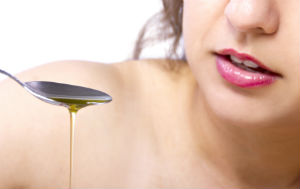
Oil pulling is an ancient Ayurvedic therapy believed to promote oral health and detoxification and available data shows promise for this natural health technique. The practice of oil pulling involves the use of food-grade oils, such as coconut oil, as an agent for "pulling" away harmful toxins. Unwanted organisms from the mouth, teeth, gums, and throat are also thought to be removed.
What is Oil Pulling?
A general oil pulling technique involves swishing around 1 tbsp. of cold-pressed, organic sesame oil in the mouth for approximately 10-15 minutes. Following this, the oil should then be spit out and the mouth rinsed with clean, fresh water. It is believed that the toxins in the mouth are pulled into the oil during the swishing process, and spitting it out results in the removal of these toxic compounds. Other oils used in oil pulling include extra-virgin coconut and olive oil, preferably organic and cold pressed. Whether it's sesame, olive, or coconut oil, all contain essential fatty acids and antioxidants that are good for your gums and teeth.
How it Works
First, the oil mixes with the saliva, turning it into a thin, white liquid. Lipids in the oil supposedly pull out toxins from the saliva, cementing its claim as an efficient detoxifier. As the oil is swished around in the mouth, it continues to absorb toxins and usually ends up turning thick, viscous, and white. Once the oil has reached this consistency (typically after ten minutes), it is spit out before the toxins are reabsorbed.
Potential Benefits of Oil Pulling
The increasing interest surrounding oil pulling in the lay population has correspondingly increased scientific scrutinization of the practice. One study showed that oil pulling with sesame oil can boost overall oral health by significantly reducing Streptococcus mutans, a microbe that contributes to tooth decay. [1] Some scientists believe the lipids in the oil reduce the adhesion of bacteria to the teeth and gums, possibly explaining its bacteria-diminishing effects.
Other research shows that oil pulling can relieve bad breath. This same research has also shown that oil pulling can noticeably reduce the presence of plaque to support the health of teeth and gums. [2] Research also shows that swishing with sesame oil produces a saponification process, or a process in which the oil produces a soap-like effect in the mouth. [3]
Some sources even claim that dental caries, or cavities, have also been shown to be reduced by up to 50% in persons who practice oil pulling. [4] The oil used in this study was sesame oil, perhaps one of the most popular oils used in oil pulling, and showed very powerful activity in the mouth. Just 40 days of oil pulling resulted in a 20% decrease in oral bacteria.
Benefits Beyond Dental Health?
Many holistic practitioners cite other benefits of oil pulling. It is believed that oil pulling stimulates the lymphatic system and aids in the transport of toxins away from vital organs. The reported benefits of oil pulling include:
- Teeth whitening
- Clear skin
- Improves digestion
- Weight loss
- Promotes normal sleep patterns
- Helps kidney and liver function
References (4)
- Asokan S, Rathan J, Muthu MS, Rathna PV, Emmadi P, Raghuraman, Chamundeswar. Effect of oil pulling on Streptococcus mutans count in plaque and saliva using Dentocult SM Strip mutans test: a randomized, controlled triple-blind study. Journal of Indian Society of Pedodontics and Preventive Dentistry. 2008 March;26(1):12-7.
- Asokan S, Kumar RS, Emmadi P, Raghuraman R, Sivakumar N. Effect of oil pulling on halitosis and microorganisms causing halitosis: a randomized controlled pilot trial. Journal of Indian Society of Pedodontics and Preventive Dentistry. 2011 April-June;29(2):90-4. doi: 10.4103/0970-4388.84678.
- Asokan S, Rathinasamy TK, Inbamani N, Menon T, Kumar SS, Emmadi P, Raghuraman R. Mechanism of oil-pulling therapy - in vitro study. Indian Journal of Dentist Research. 2011 January-February;22(1):34-7. doi: 10.4103/0970-9290.79971.
- T. Durai Anand, C. Pothiraj, R. M. Gopinath and B. Kayalvizhi. Effect of oil-pulling on dental caries causing bacteria. African Journal of Microbiology Research Vol.(2) pp.063-066, March, 2008.
†Results may vary. Information and statements made are for education purposes and are not intended to replace the advice of your doctor. If you have a severe medical condition or health concern, see your physician.



